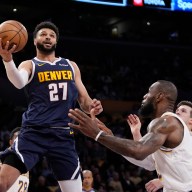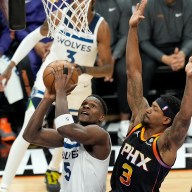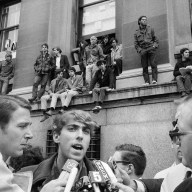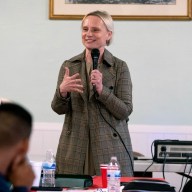Aaron Eckhart remembers watching Al Pacino film his big locker room speech at the end of Oliver Stone’s football saga “Any Given Sunday.” He had to watch it many times. “He just got better and better,” he recalls. Over 15 years later and Eckhart is playing his own head coach in “My All American,” playing University of Texas Austin legend Darrell Royal. But the film, Eckhart likes pointing out, is not about Royal. It’s about Freddie Steinmark (Finn Wittrock), a star athlete who, halfway through his college football stint, contracted bone cancer and died. Playing a coach must be a challenge. Doubly so if you’re playing a college football legend.
I got to Austin. I was eating in a nice steakhouse. I put the first bit of steak in my mouth and I looked up, and there’s an oil painting of Coach Royal right over my head. I was like, “Are you kidding me? An oil painting? Maybe a picture of him, but an oil painting? This guy means something.” I was talking to everyone I could, and I kept getting that look of like, “Dude, you ain’t half the man he is. You don’t have a prayer.” [Laughs] RELATED: Antonio Banderas on what it’s like to shoot in a mine for “The 33” Texas is tough, as is Texas football.
Texas football is tough. The South is tough. I did a movie in Baton Rouge, and I basically lived on LSU campus. You’d go to a coffeeshop and there were soccer moms debating over whether they should replace the quarterback or not. These people are invested in it. So I was a little bit nervous. You’ve got the accent, you’ve got the mannerisms, and you’ve got the former players either approving or disapproving of you interpretation. Luckily the movie’s not entirely about Darrell Royal.
The movie’s about Freddie Steinmark. It’s about what happened in the ’60s and the advances in medical care then versus what they have today — how a kid could get bone cancer and play through it. These guys were playing through pain; that was the edict. You were on the field unless your leg was broken. It’s different today, with the concussion protocol. There’s more attention paid to that. In those days there weren’t any. How many times do you hear about players who lie to their coaches, lie to the medical staff, because they want to stay in the game. A doctor can only do so much. Today they demand that you get off the field. In those days if the guy said, “I’m good, coach,” they were like, “OK.” It was part of proving yourself as a man. It was macho. What could be more macho than football? But Freddie had a real problem. Coach Royal takes a real interest in Steinmark, but their closeness seems like it wasn’t the norm.
A head coach of such a large program doesn’t have as much contact with his players as we think he does. It’s such a bureaucracy. There are so many demands outside of football that command your time. You hear a lot about the offensive line coach, the quarterback coach — those are the ones dealing with the players on a day-to-day basis. The coach is in the office or on a stand. He’s asking how they’re doing, then he eyeballs them. There are former players who told me in their four years of scholarship the coach said three words to them — and they were starting players. [Laughs] He was feared. They would rather do anything than be stuck in a hallway with the coach, because he was a sonofoab—, in the sense that he was a task-master, he was a harda—. I thought they were hands on. I thought they knew their names, where they came from. That’s just not the case. You’re working on getting a film that you’re directing, as well as starring in and co-writing, off the ground. Doing it yourself seems like a good way to get control of your own career.
At my age you have to. If you don’t you’re not going to work, or you’re not going to work on things you want to work on. Being a gun-for-hire is fine for a decent life, but if you’re talking about getting the best out of yourself and truly being who you are and having a voice, you have to do that. Hollywood’s changed too. This movie’s an exception, because it was privately funded. But Hollywood I don’t think would make this movie. RELATED: Aaron Eckhart on playing the president in “Olympus Has Fallen” You’ve talked in the past about being afraid of being typecast as villains. But you’ve been playing good guys, sometimes very good guys, for awhile now.
I think the “villains” I’ve played have been pretty strong. And they’re politically incorrect villains: “In the Company of Men” and “Thank You for Smoking,” even “The Dark Night,” though I don’t consider him to be a villain. Those are the most visible films I’ve done. But the reason I wanted to do this movie is because it’s a family movie. How many movies do we go to where you’re sitting with your mom and you say, “Oh my god, I can’t believe I’m watching this movie with my mom.” It’s embarrassing. I feel as I get older I want to be involved in good storytelling and family movies, where the whole family can go see it. You live with these people. [Laughs] They want to go to your premieres, man. I went to school at Brigham Young, so they can’t show any of my movies. This one they could probably show. They could show the sanitized version of “In the Company of Men,” which would have to be very short and have a nice ending.
We did the play [at Brigham Young], but they shut us down. We rehearsed for two months, three months. We were scheduled to go in a regular theater. Neil [LaBute] calls me up the night before and says, “Aaron, we lost the theater. We have to go the experimental theater at eight in the morning.” So we gave one performance of it at eight in the morning. After all of that, 10 or 12 people say it. And what nobody saw was Neil was Chad [the more villainous of the two male protagonists, played by Eckhart in the 1997 film version]. I played Howard. Neil’s a very good actor. I said to him the other day, “You know what? Neil, the tragedy is no one’s seen you act. You should be in a movie.” He’s a great actor. Follow Matt Prigge on Twitter @mattprigge
Aaron Eckhart on why he wants to do nicer movies
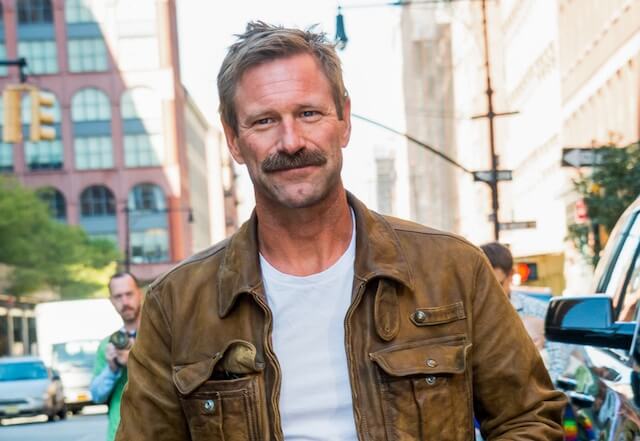
Getty Images

